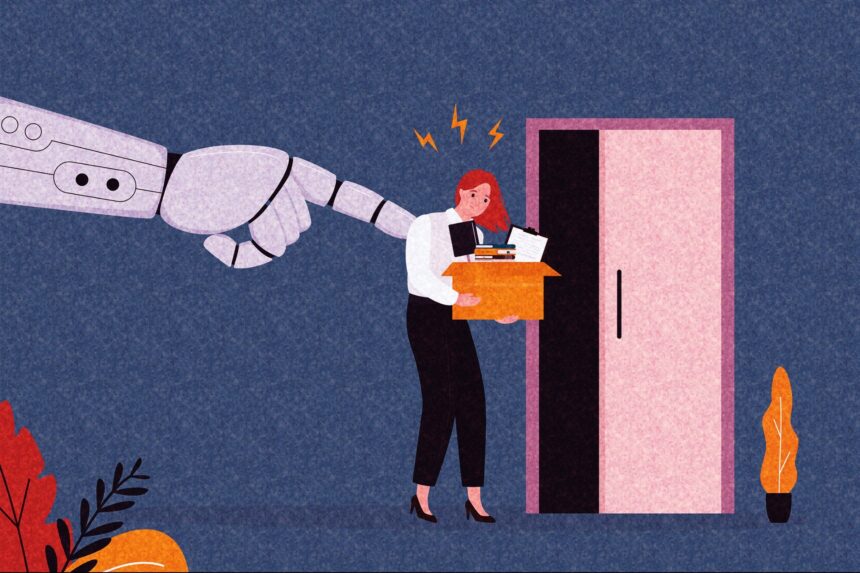Opinions expressed by Entrepreneur contributors are their very own.
Key Takeaways
- AI is eliminating entry-level roles, threatening the standard pipeline the place companies prepare and develop their future leaders.
- Corporations should rethink hiring methods now — or danger long-term expertise shortages that may gradual development, weaken competitiveness, and in the end harm the underside line.
Synthetic intelligence isn’t simply reshaping industries — it’s quietly gutting the very first rung of the profession ladder. Entry-level jobs, as soon as a coaching floor for future leaders, are disappearing quick.
A 2025 Bloomberg evaluation stories that the current faculty graduate class is struggling to safe full-time work. In the meantime, the World Financial Discussion board’s Way forward for Jobs Report predicts that 40% of employers count on to cut back their workforce due to AI-driven automation. In response to Anthropic’s CEO, AI may get rid of half of all entry-level white-collar jobs inside 5 years, driving unemployment as excessive as 20%.
At first look, eradicating repetitive duties appears to be like like a win. Quicker work, fewer errors, decrease prices. However entry-level years are about greater than finishing duties — they’re the place workers study, fail, experiment and develop. With out these years, firms danger ravenous their very own management pipelines.
So what ought to entrepreneurs do when the standard ladder disappears?
Don’t simply reduce prices — construct careers
It’s tempting to see AI as a shortcut: automate processes, cut back headcount and get monetary savings. However in the event you measure success solely by {dollars}, you miss the larger alternative: utilizing AI to speed up human improvement.
The businesses that thrive on this new period are those asking: How can AI take over the routine so our individuals can concentrate on development, creativity and management?
This mindset shift turns AI from a cost-cutting device right into a career-building device — making a workforce that’s smarter, quicker and extra strategic.
Associated: Utilizing AI Gave Me Free Time — So I Turned It Into My Aggressive Edge
How AI modified hiring at my firm
At my tech firm, FORE Enterprise, our unique group was made up primarily of younger expertise of their 20s. They dealt with a lot of the grunt work: coding small modules, compiling stories, testing, debugging. 4 years in, nevertheless, our group construction has shifted. We’re hiring extra senior workers who know the way to leverage AI to generate high-quality code and analyze complicated issues.
The outcomes are placing. One senior analyst utilizing AI effectively can do the work of a number of junior analysts. That enables senior expertise to concentrate on consumer wants, big-picture design and technique. It additionally ensures that the work AI produces is correct — people nonetheless want to acknowledge its shortcomings and management for high quality.
However this shift raises questions. If the entry-level ladder is disappearing, how can we prepare the following technology of leaders? If junior workers not carry out easy, repetitive duties, how will they construct abilities and advance? And the way will firms replenish expertise when senior workers retire or transfer on?
Fill the gaps AI can’t cowl
AI might automate duties, however it will possibly’t replicate human judgment, emotional intelligence or complicated problem-solving. Meaning gentle abilities are extra precious than ever.
Analysis confirms this shift. LinkedIn’s Abilities on the Rise stories that whereas AI literacy is the fastest-growing talent, the following most necessary abilities are battle mitigation, adaptability, revolutionary pondering, public talking, solution-based promoting, buyer engagement and stakeholder administration — all human-centric and largely irreplaceable.
Google’s Mission Oxygen additionally exhibits that glorious managers excel at teaching, communication, and collaboration — abilities that AI can’t reproduce. Corporations that emphasize these traits in hiring, coaching, and promotion see measurable enhancements in group efficiency, satisfaction, and retention.
At FORE, we now prioritize hiring for emotional intelligence and adaptableness alongside AI literacy. Candidates who can navigate ambiguity, talk with purchasers and information AI outputs successfully are invaluable.
Construct hybrid roles designed for the AI period
Entrepreneurs don’t want to rent conventional roles in a standard method. As a substitute, they’ll create hybrid positions that mix business information, AI experience and problem-solving means.
For instance, as an alternative of hiring a junior analyst, we search for AI-analysts — workers with analyst abilities who may apply AI to enhance effectivity and output. Legal professionals with AI proficiency now command a 56% wage premium, however the funding pays off: these workers produce quicker, higher-quality work and remedy issues {that a} junior worker would wish weeks to sort out.
Younger workers who undertake AI early — even with out formal coaching — have a bonus. They carry curiosity, technical aptitude and adaptableness, which place them for these hybrid roles. For founders, this additionally solves the expertise pipeline problem by mixing studying, AI adoption and profession development right into a single place.
Look past levels — concentrate on abilities
Conventional schooling continues to be precious, however it’s not the one indicator of expertise. Entry to high universities is proscribed by household earnings, geography, and alternative. AI can degree the taking part in subject.
On-line AI-driven studying platforms permit anybody with an web connection to obtain personalised tutoring, study at their very own tempo and grasp abilities beforehand taught in costly packages. Candidates with out prestigious levels can produce work that rivals historically educated friends.
Entrepreneurs and hiring managers ought to shift focus from credentials to abilities and demonstrated efficiency. Use undertaking portfolios, abilities exams and real-world problem-solving workouts to determine high performers. This strategy uncovers expertise that will in any other case be neglected.
Associated: How AI Can Make Beginning a Enterprise on Your Personal Even Simpler — and Quicker
The underside line
AI isn’t coming — it’s already right here. It’s going to change how we rent, prepare and promote. But it surely gained’t exchange people. It’s going to redefine their roles.
Entrepreneurs who deal with AI as a associate fairly than a alternative will win. Recruit for human abilities that AI can not replicate, create hybrid roles that maximize each individuals and know-how and look past levels to uncover hidden expertise.
The way forward for management is dependent upon it. Begin rethinking your hiring technique now — as a result of the leaders of tomorrow gained’t come from algorithms. They’ll come from the individuals you select to develop in the present day.
Key Takeaways
- AI is eliminating entry-level roles, threatening the standard pipeline the place companies prepare and develop their future leaders.
- Corporations should rethink hiring methods now — or danger long-term expertise shortages that may gradual development, weaken competitiveness, and in the end harm the underside line.
Synthetic intelligence isn’t simply reshaping industries — it’s quietly gutting the very first rung of the profession ladder. Entry-level jobs, as soon as a coaching floor for future leaders, are disappearing quick.
A 2025 Bloomberg evaluation stories that the current faculty graduate class is struggling to safe full-time work. In the meantime, the World Financial Discussion board’s Way forward for Jobs Report predicts that 40% of employers count on to cut back their workforce due to AI-driven automation. In response to Anthropic’s CEO, AI may get rid of half of all entry-level white-collar jobs inside 5 years, driving unemployment as excessive as 20%.
At first look, eradicating repetitive duties appears to be like like a win. Quicker work, fewer errors, decrease prices. However entry-level years are about greater than finishing duties — they’re the place workers study, fail, experiment and develop. With out these years, firms danger ravenous their very own management pipelines.








